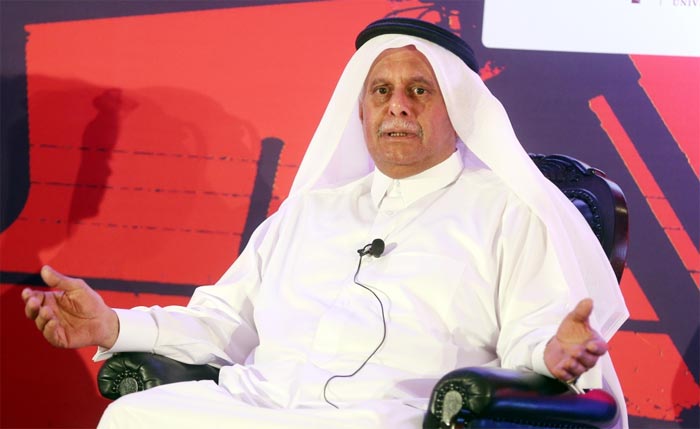HE Abdullah bin Hamad al-Attiyah at the Gulf Intelligence Doha Energy Forum on Tuesday. Picture: Jayan Orma
By Pratap John
Chief Business Reporter
HE Abdullah bin Hamad al-Attiyah, president of the Administrative Control and Transparency Authority expects to see oil price around $60 a barrel by the year-end.
“We may not see a higher price…say $70 or more. It will take a few years,” al-Attiyah told Gulf Times on Tuesday.
Asked whether the era of $100 or more has ended, al-Attiyah, the former Deputy Premier and Minister of Energy and Industry said, “We should forget it for the time being.”
Al-Attiyah said Qatar would be able to manage with oil price around $60 a barrel.
“We can live with $60…this is because our production cost is low. All our projects that have been built over many years are payback - completely. In my opinion, we can live with $60. But it means some cost-cutting… some budgetary reforms.
“In the 90s, we have lived with below $9 a barrel. Obviously, $60 is better than $9. And in the 90s, we had only one commodity – oil… and we were a small producer as well.
“Now we have different products – oil, LNG, GTL, chemicals, helium, steel, aluminium and fertiliser. We export to some 98 countries around the world. Our basket is very well diversified with products and export markets.”
While producers always want higher price, consumers obviously look for cheaper price, he said.
“Higher oil price is not good for producers or consumers. At the end of the day, I need reasonable price for my product and a healthy consumer,” al-Attiyah said.
“From our experience, I can say very high oil price is not always favourable to us. Remember, when oil was trading at $110 a barrel, we had to deal with an inflationary environment. Everything was expensive - material costs were high and same was the case with land and real estate.
“Globally, there is a sharp reduction in construction costs consequent on the oil price decline. This trend is likely to continue.
“If the price stays at $60, I can assure you we may have better returns than from a high price environment.”
He said the debate on price indexation would continue because consumers never had a consistent stand on this.
“When the oil price is low, they want oil indexation. And when the price goes up, they are averse to oil indexed pricing.”
Earlier, speaking at the Gulf Intelligence Doha Energy Forum, al-Attiyah, also a former president of the Organisation of Petroleum Exporting Countries, said he believed Opec would not change policy at its next meeting unless other producers cut first.
“I don’t advise Opec to have an extraordinary meeting without having a concrete decision to change policy,” said al-Attiyah, who was associated with Opec at different capacities for about 40 years.
Opec is scheduled to meet in Vienna in June, seven months after deciding to maintain output levels and protect market share. Opec’s next regular meeting is scheduled for June 5.
Brent crude, a benchmark for more than half of the world’s oil, has dropped 26% since Opec’s decision on November 27, a Bloomberg dispatch showed.

